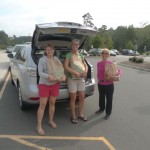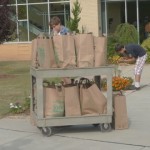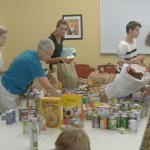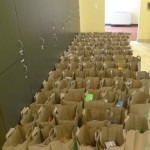Food PORCH
By Cecil Poole
This morning I tried to jump into in the van, what we in Australia would call ‘A People Mover’, with my 2 year old namesake grandson only to be confronted with bag after bag of groceries. The car seemed packed to the gunwales with them, great big brown paper bags, with paper handles stuck on the sides. There were ‘Trader Joe’, Whole Foods’ and ‘Co-op’ bags – the type used by environmentally aware grocery shoppers. No plastic bags here thank you very much. I was just about to unload them, thinking that although my daughter in law (The d.i.l.) was pregnant, to shop up this much was surely ridiculous, when she said no, no, leave them there, they are for the food drive.
We finally squeezed onto the van, I dropped the happy grandson at child care and then fronted The d.i.l. about the food – where did it come from, what was it for, where was it going and can I come and see. Of course she said yes, and off we headed, my atheist d.i.l. and her atheist f.i.l, to the Saint Thomas More Catholic School and Church precinct. (Not more Catholic than any other.)
 Cars and vans lined the curb, doors and trunks agape, trolleys cluttering the sidewalk. Each car delivering similar bags of groceries. We were met by a man and a woman each in a green tee shirt with ‘PORCH’ printed across the front. They happily and willingly loaded all our bags onto the trolleys and we helped wheel them inside, through the foyer to a large conference room.
Cars and vans lined the curb, doors and trunks agape, trolleys cluttering the sidewalk. Each car delivering similar bags of groceries. We were met by a man and a woman each in a green tee shirt with ‘PORCH’ printed across the front. They happily and willingly loaded all our bags onto the trolleys and we helped wheel them inside, through the foyer to a large conference room.  Immediately inside the door were two tables onto which our bags were placed and then instantly stripped of their goods. The bags went one way to be inspected and if passed then folded for re-use, otherwise trashed – into the recycle bin of course.
Immediately inside the door were two tables onto which our bags were placed and then instantly stripped of their goods. The bags went one way to be inspected and if passed then folded for re-use, otherwise trashed – into the recycle bin of course.
 The food was all sorted into myriad sections. There were bulk sauce, rice, noodles, soups, single serves, popcorn, pasta, peanut butter, cereal and breakfast food, boxed milk, beans, bags of beans, and baking goods, just to mention a few. The energy, the joy of doing pervaded the space, smiles and laughter the order of the day, along with quick and efficient work.
The food was all sorted into myriad sections. There were bulk sauce, rice, noodles, soups, single serves, popcorn, pasta, peanut butter, cereal and breakfast food, boxed milk, beans, bags of beans, and baking goods, just to mention a few. The energy, the joy of doing pervaded the space, smiles and laughter the order of the day, along with quick and efficient work.
 Then bags of mixed goods were assembled using the used bags, doubled so as not to fail. These then were carted back outside, on these same trolleys and packed into delivery cars and vans. There seemed to be little hierarchy, no-one wandering around lost, saying what should I do, or I wish they were better organised. The appearance was very much of a grass roots organisation committed to what they were doing.
Then bags of mixed goods were assembled using the used bags, doubled so as not to fail. These then were carted back outside, on these same trolleys and packed into delivery cars and vans. There seemed to be little hierarchy, no-one wandering around lost, saying what should I do, or I wish they were better organised. The appearance was very much of a grass roots organisation committed to what they were doing.
From here the food goes to what is locally known as ‘Food Pantries’, or direct to people, families typically, ‘in need’. It seems that those ‘in need’ are identified by school social workers.
The d.i.l. is a “neighbourhood collector” collecting in one of over 120 neighbourhoods. This is done monthly with participants leaving their contribution on the front porch.
Whilst mightily impressed I could not help thinking of the quote “If I feed the poor then people call me a saint, if I ask why they are poor then people call me a communist.”
(PORCH is the name of People Offering Relief for Chapel Hill Carrboro Homes, visit their site here)
From their website:
Poverty & Hunger Facts
While the towns of Chapel Hill and Carrboro are widely perceived as affluent, all too many of our neighbors are falling into poverty. According to the most recent figures from the U.S. Census Bureau, one in six families in our community now live at or below the poverty level – about $22,000 a year for a family of four. Many of these families comprise the “working poor.” They log long hours at their jobs – in construction, the poultry industry, and UNC Housekeeping, for example – but their paychecks are still stretched way too thin. Almost every day, these families are forced to wrestle with difficult and painful decisions: Refill a prescription or the gas tank? Repair a dripping faucet or a leaking roof? Fall behind on the utility bill or the phone bill? Skip breakfast or lunch? Through its monthly Hunger Facts, PORCH hopes to create more public awareness about the reasons for the rise in poverty and hunger, and how we as a community can more effectively respond. It begins with porches. Each time a canned good is left out on your porches, the safety net for our most vulnerable neighbors grows a little wider and stronger.

Pingback: Grandparenting again | pcbycp